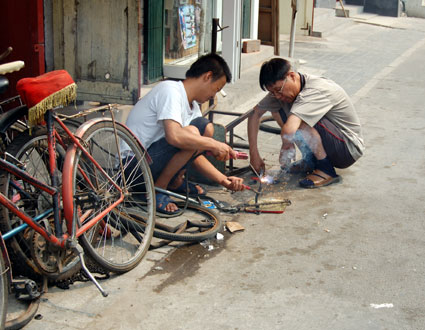
BEIJING- Since I arrived in China I’ve made it my mission to avoid Westerners. Hitting the Beijing historical sites a week before the Games, then traveling by overnight train to Xi’an (three Chinese and me in a tiny cubicle with four bunks — now that was fun), I’ve found myself immersed in a sea of Asian faces. An odd feeling, but not as odd as being surrounded by only Chinese voices.
The Chinese are a garrulous people, speaking in monosyllabic singsong nasal tones, downright noisy by my standards. Interestingly, though, the sounds don’t bother me at all. The voices seem to blend with the screeching of the cicadas or the chirping of the birds. I hear them, but since I don’t understand the language, or even the intonation, the noise becomes like background music to me. Less intrusive than listening to my iPod because I don’t feel compelled to fast forward, contemplate lyrics, or sing along. I think it’s like being deaf, only with sound.
Avoiding Westerners has become more difficult now that the Games are underway. Yesterday, I found a safe haven in the hutongs of old Beijing. For several hundred years, the majority of Beijing residents lived in siheyuan, which are housing compounds with rooms arranged around a central courtyard. The hutongs, or narrow alleyways, run between rows of siheyuan. Hutong has come to refer to neighborhoods set up this way.
Life in the hutongs is a slow and simple affair. Elderly women sit side-by-side on stools barely six inches off the ground. The old men squat around wooden game boards, occasionally laughing at one thing or another. Middle-aged women sew or cook in tiny rooms with open doors, always facing the street so as not to miss any of the goings-on. Little children do as little children do everywhere. I didn’t see many young men and women in the hutongs. I imagine they were somewhere in the city, straddling the divide between the old and new China.
Wherever I walked, the people stared at me with undisguised curiosity. They didn’t appear friendly, nor unfriendly. They simply watched. I would return their gaze for a moment, bow my head slightly and smile. “Nin hao,” I’d say, hoping that my attempt to singsong the syllables didn’t pain them too much. Without fail, they smiled and returned the greeting enthusiastically. Often they offered me whatever they had in their hands—a piece of fruit, a paper fan, a plastic-beaded bracelet. I would point to my camera, asking permission to take a picture. They would laugh and blush and hide behind each other in protest. I wasn’t sure how to interpret their apparent reticence, but I thought it was best to accept it at face value and photograph the laundry or the bicycles instead.
With the modernization of Beijing, many residents have moved from the hutong to the high-rise. But I found that a few traditional hutongs, home to lovely people who can remember when, may still be found by a girl on a quest to avoid the West.











